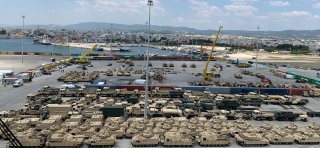How the War in Ukraine Transformed A Quiet Greek Port into a Geopolitical Center
Situated in the northeastern region of Greece, Alexandroupolis has evolved into a key strategic point for the transit of supplies and weaponry to Ukraine.
Turkish authorities have long warned about the safety and environmental damage risks of steadily increasing tanker and shipping traffic through the straits, where more than 140 maritime incidents have occurred since 2006. The Alexandroupolis port would alleviate logistical bottlenecks and environmental stress on the straits astride a growing Istanbul population of nearly twenty million citizens.
Given the recent rapprochement signals by Prime Minister Mitsotakis and Turkish president Recep Tayyip Erdogan at the NATO Summit in Vilnius, reliable and environmentally sound supply lines throughout southeastern European markets from the Aegean and eastern Mediterranean Seas should be a new sector of strategic cooperation between the neighboring allies.
An Opportunity for Regional Development and Security
There is no assurance that Russia will stop blocking Ukrainian ports any time soon following its withdrawal from the grain deal. Even if Black Sea shipping is restored, the threat of recurring crises will loom for years, perhaps decades. The need for strategic diversification of energy and food corridors in case of future crises, or as an alternative scenario if Russia-Ukraine agreements collapse, is self-evident. Ship owners can expect to bear increased insurance premiums to enter the Black Sea and will remain reluctant to have their vessels and cargoes pass through a recent war zone without safety assurances.
Rather than be turned into a geopolitical flash-point, developing the Alexandroupolis port can help to stabilize the global food market and provide abundant natural gas supplies to directly replace Russian LNG supplies which remain excluded from EU sanctions until at least 2027. It will also deliver to NATO new routes from the south to project power against serious Russian and Chinese inroads, including growing influence over critical infrastructure in Syria, Libya, the Balkans, and across southeastern Europe.
U.S. support for the peaceful development of regional overland interlocking markets via sea-based communication lanes emanating from Alexandroupolis positions the port to become the next military, energy, transport, and logistics hub within the arc of regional crises during and beyond the war in Ukraine.
John Sitilides is a geopolitical strategist at Trilogy Advisors and diplomacy consultant to the State Department under a U.S. government contract.
The views expressed in this article are those of the author and do not reflect the official positions of the U.S. government.
Image: Flickr.

